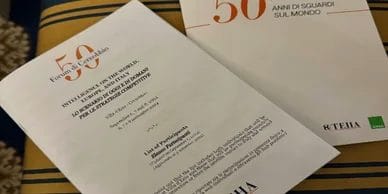
Last week, on the shores of Lake Como, the 50thedition of The European House – Ambrosetti (TEHA) Forum took place. As usual, this was an occasions for world leaders, mainly from the US, China, Europe, and the Middle East, to meet and discuss the most pressing geopolitical and macroeconomic issues. Being the 50th edition, an additional effort was made in order to have as many top leaders as possible participating.
For example, both Ukraine’s president Volodymir Zelensky and EU rotating president Viktor Orban, who have opposite views on the future of Europe, and on Russia, were present. Several US senators were also present, just a couple of months before its presidential election. Queen Rania of Jordan also spoke about the ongoing war in Gaza, and the president of Azerbaijan Ilham Aliyev provided the keynote speech on the first day of the forum. Italian PM Meloni (along with half of her government) were present, as were key figures from the EU Commission, including the Commissioner to Economic and Monetary Affairs Paolo Gentiloni and the High Representative for Foreign Affairs and Security Policy, Josep Borrell.
In absence of “open” macro-financial crises (for a change), the conference focused on rising geopolitical tensions and emerging technological developments. If anything, the fact that all the key G7 central banks are easing their policy stances, or are about to do so, will help reduce tensions in financial markets. One could only wish that geopolitical tensions could be dissipated that easily.
The first few sessions discussed the geopolitical landscape. Before the deep dives into the Russia-Ukraine conflict with President Zelensky, and the war in Gaza and the West Bank with Queen Rania, there was a thorough discussion about the ongoing Cold War 2 between the US and China, which included Niall Ferguson, Fu Ying and Meghan O’ Sullivan for the geopolitical part, and Eric Li and Nouriel Roubini for its macro component.
Social media are not subject to the same regulations as is the press, whose editors and publishers are required to verify the truthfulness of news published. It has therefore become the vehicle to spread all sorts of fake news, such as those that caused the mass riots in England in early August. So the ability of circulating fake news cannot be confused with defending the freedom of speech.
Since the Democrats are saying that Trump is a danger for democracy, considering his involvement in the January 6th, 2021 assault on Capitol Hill and his endorsement of Project 2025, the Republicans are now saying that Kamala Harris would be a danger for democracy since she would suppress the freedom of speech and would silence her opponents via censorship. This analogy seems to be very stretched.
In a world in which Germany’s far-right, sometimes neo-Nazi party Alternative fur Deutschland wins its first election (as we predicted it would in our preview), and in which Afghan women are actually being denied the freedom of speaking in public, confusing a ban on spreading fake news with censorship is a dangerous exercise. Freedom of speech is the bedrock of democracy, as Musk is correctly saying. Spreading fake news is the surest way of corroding this freedom from within.